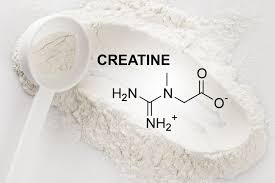Everything You Need To Know About Creatine
What is creatine?
Creatine is a naturally-occurring substance that’s typically found in the muscles to promote energy production and muscular contraction.
Many gym-goers and professional athletes take creatine supplements on a regular basis to enhance their performance and increase their lean muscle mass.
Creatine interferes with several biochemical reactions to accelerate the production of adenosine triphosphate (ATP), which is the primary form of energy that our cells use.
In this article, we will briefly cover the underlying mechanism of creatine, as well as the expected benefits from supplementing your body with it.
How does creatine work
Generally speaking, when you take creatine supplements, the internal storage of phosphocreatine (the main form stored in muscles) will increase, which permits for faster and more efficient production of ATP.
As a result, you will feel more strength in your muscles, allowing you to reach optimal performance.
Aside from energy production, creatine helps performance by boosting the capacity of the workload, which is crucial to lifting more weight and/or increasing training duration.
Creatine also signals the endocrine glands to secrete anabolic hormones (e.g., growth factors, IGF-1) that promote muscle repair and hypertrophy.
The final mechanism involves the slowdown of proteolysis (protein degradation) and the reduction of myostatin concentrations.
If you’re not familiar with myostatin, it is a protein that inhibits intracellular cascades that promote muscle hypertrophy.
The benefits of creatine
Muscle hypertrophy
Creatine is extremely effective at inducing muscle hypertrophy and fiber lengthening. Contrary to popular belief, creatine is not exclusive to high performing athletes, as even sedentary individuals could benefit from its positive effects.
In one study, older adults were given creatine supplements for 14 weeks while getting regular exercise. At the end of the study, participants who took creatine supplements reported more muscle growth relative to the control group.
Performance optimization
As we mentioned earlier, creatine optimizes the cellular production of ATP to improve strength, flexibility, and performance.
In a 2003 review, researchers found that adding creatine supplements to a training routine increases strength by up to 8% and weightlifting performance by 14%
These results only emphasize the important role creatine plays in the fields of fitness and athletics. The main mechanism involves the increased concentration of ATP inside the cell, which allows your muscles to reach the maximal ability of the phosphagen system.
Other benefits
Aside from muscle hypertrophy, creatine also affects many other physiological functions, including:
- Improved cognitive function
- Enhanced blood sugar control
- Reduced fatty deposition in the liver
- Improved quality of life for the elderly
Takeaway message
Creatine is a fantastic substance that offers numerous health benefits to the body, especially for athletes and fitness gurus.
Hopefully, this article helped you appreciate the role of creatine and what benefits to expect from supplementing your body with this substance.
If you still have questions about anything discussed above, please don’t hesitate to ask us in the comment section below.

